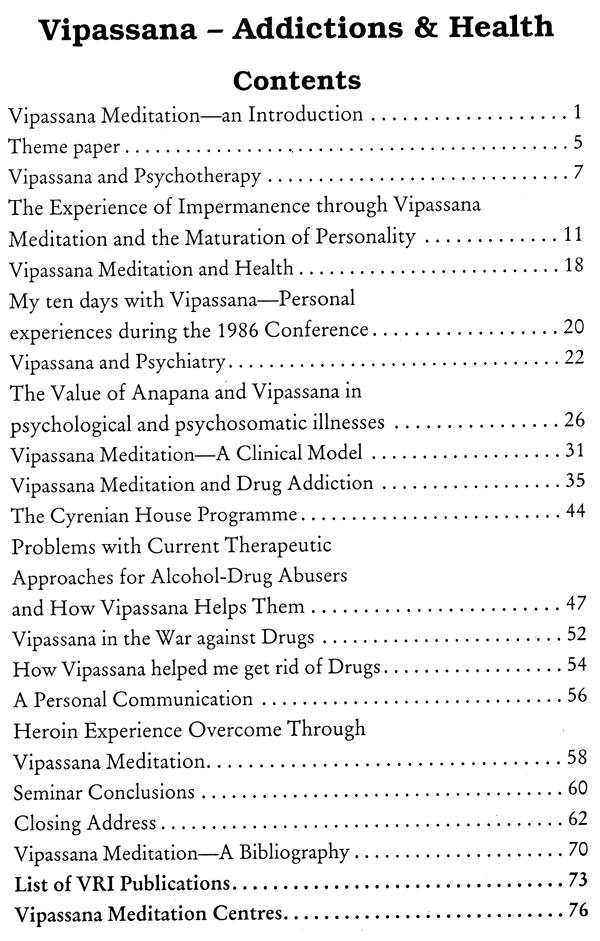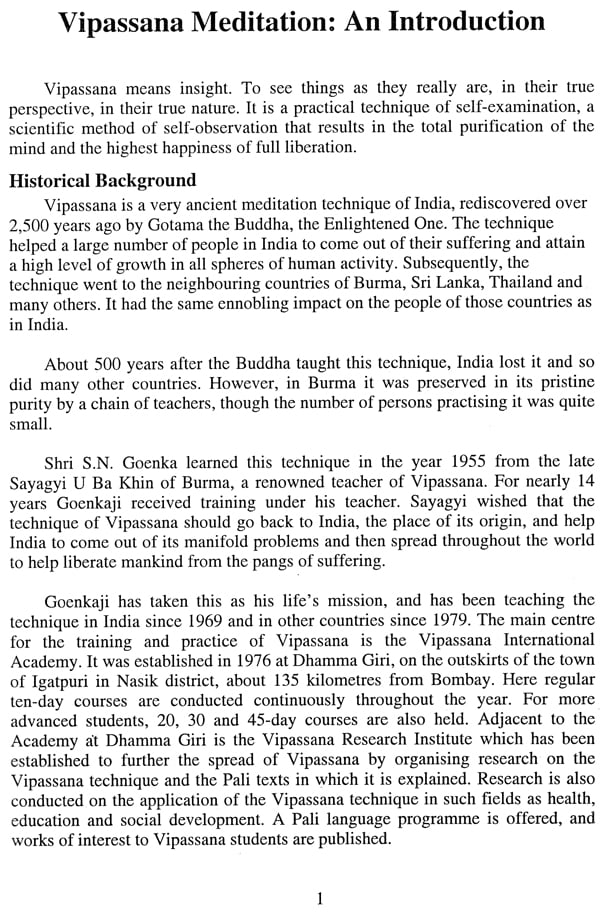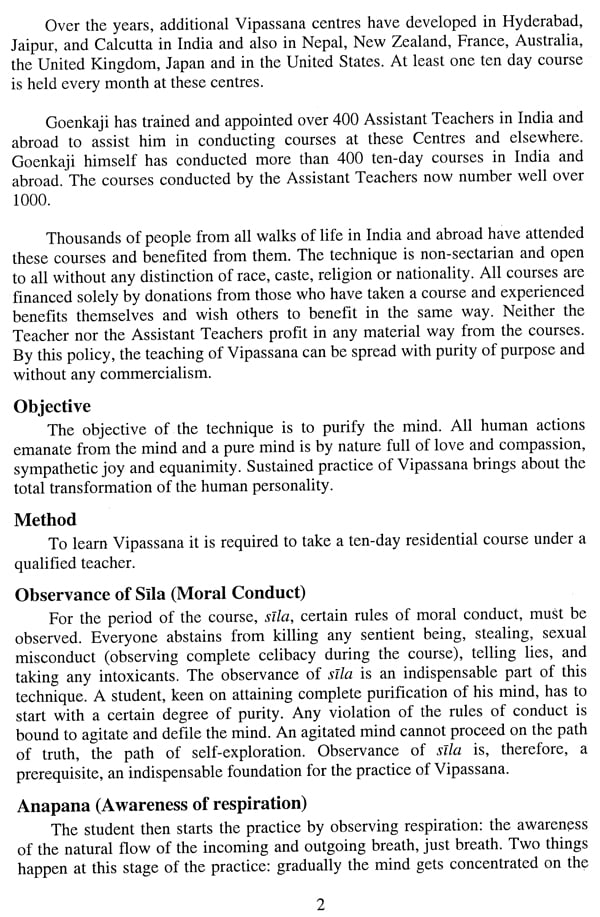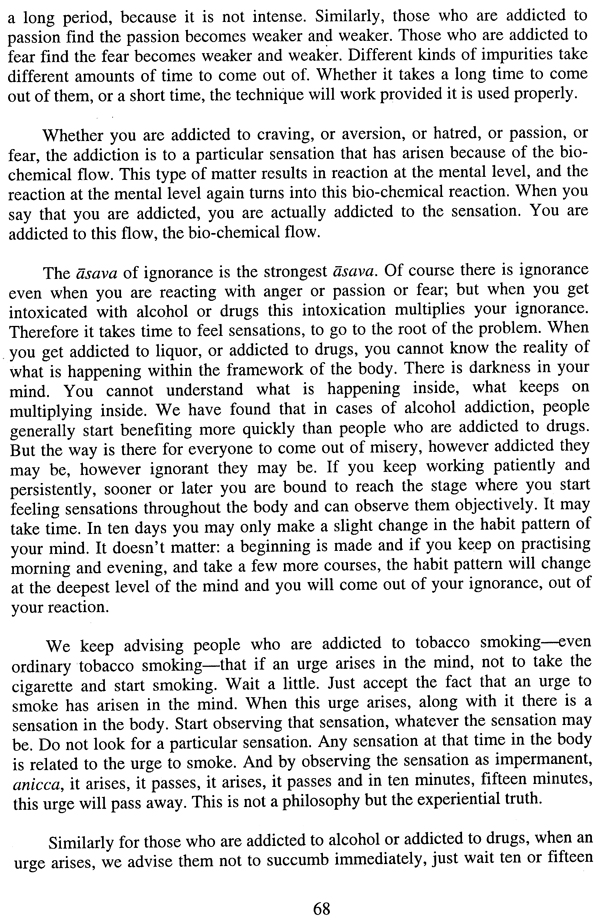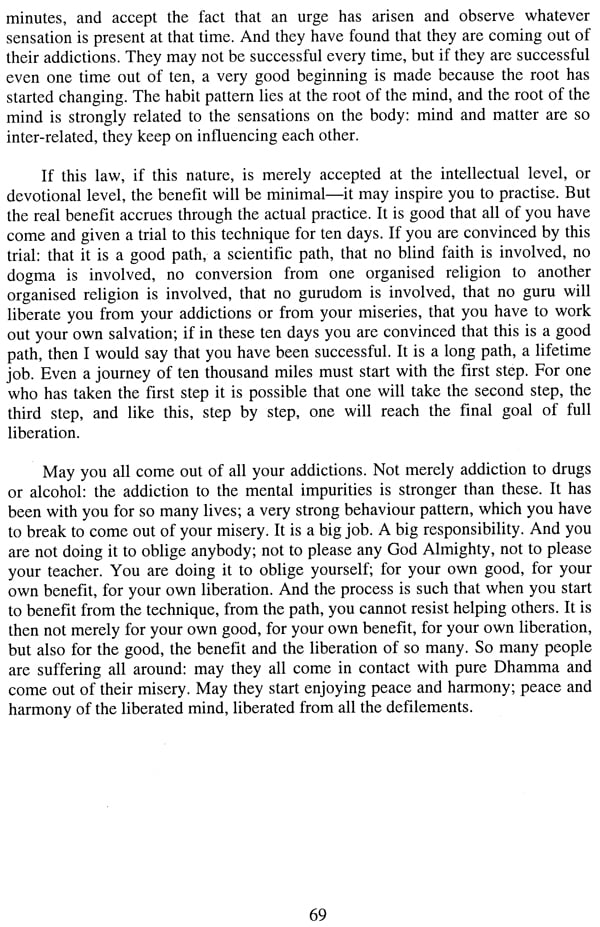
Vipassana- Addictions & Health
Book Specification
| Item Code: | NAW234 |
| Publisher: | Vipassana Research Institute |
| Language: | English |
| Edition: | 2015 |
| ISBN: | 8174141316 |
| Pages: | 78 |
| Cover: | Paperback |
| Other Details | 10.00 X 7.00 inch |
| Weight | 180 gm |
Book Description
Shri Satyanarayanji Goenka was born in Mandalay, Myanmar in 1924. Although he topped the list of all successful candidates in the whole of Myanmar in the tenth class, he could not continue his studies further. At a very early age he set up many commercial and industrial institutions and earned fabulous wealth. He also established many social and cultural centres. Because of tension he became a victim of migraine, which could not be cured by doctors of Myanmar and of other countries in the world. Then some one suggested him to take a course of Vipassana. Vipassana has done well not only to him but it has also been benefiting many others.
He learned Vipassana from Sayagyi U Ba Khin in 1955. Sitting at the feet of his teacher he practiced it for fourteen years He also studied the words of the Buddha during this period. He came to India in 1969 and conducted the first vipassana course in Mumbai. After that a series of courses were held. In 1976 the first residential course of vipassana was held in Igatpuri and the first centre of vipassana was established here. Up till now 170 centres have been established all over the world. New centres also are coming up. At these centres 1500 trained teachers teach vipassana in 55 languages of the world. Not only ten- day courses are conducted at these centres but also at some centres 20-day, 30-day, 45-day and 60-day courses are conducted. All courses are free of charge. The expenses on food and accommodation etc are met by the self-willed Dana given by those who benefited from the course. Seeing its benevolent nature vipassana courses is held not only for the inmates of jails and school children in the world but also for police personnels, judges, government officers etc.
A Seminar on Vipassana Meditation was held from 28 November to 9 December, 1989, under the sponsorship of the Vipassana Research Institute. Its twin objectives were: to study and explore the application in life of Vipassana as a technique for improving health, and to look into its use as a rehabilitative instrument for those using, or addicted to substances such as alcohol, drugs, etc.
Participating in the Seminar were distinguished scholars, Government officers, members of the medical, legal and other professions, social workers and Vipassana meditators. 300 participants and guests attended the Inaugural Function and Scientific Session, of which nearly 250 of them continued on for a ten day Vipassana Course conducted by Mr. S.N. Goenka. After experiencing the effects of Vipassana for themselves, within themselves, the participants engaged in a discussion of its various aspects and made recommendations.
The Chief Guest was Dr. V.N. Bagadia, Emeritus Professor of Psychiatry, Seth G.S. Medical College & K.E.M. Hospital, Bombay, and Honorary Psychiatrist, Bombay Hospital é& Research Centre. He discussed Vipassana as an important psychological treatment method, and mentioned that though its beneficial effects are seen clinically, research needs to be conducted with a rigorous scientific methodology.
The Scientific Session was inaugurated by Dr. Yusuf A. Merchant, President, the Drug Abuse Information, Rehabilitation & Research Centre, Bombay, and Member, The Central Advisory Board for Drug Prevention & Control, New Delhi. Dr. Merchant spoke on the threat posed by drug abuse to the world at large and India in particular; he further expressed confidence that Vipassana can play a vital role in the rehabilitation of addicts.
The Principal Vipassana Teacher, Mr. S. N. Goenka, gave the closing address, in which he explained how Vipassana enables one to be free from not merely addiction to drugs or alcohol, but also the strongest and deepest conditioned mental reactions which are the root cause of misery. He called Vipassana a non-sectarian art of living in harmony with the universal Dhamma ‘the Law of Nature, whereby freedom from suffering may be attained.
The present volume has been prepared to stimulate interest and a scientific pursuit in this ancient yet new meditation technique. Therefore, in addition to the papers presented at the Seminar, other relevant articles have also been included.
